Photographs on social media of Patriot missiles stationed in Taipei during last week’s Han Kuang exercises showcase the challenges the military faces in enhancing national security awareness while ensuring operational security, a military source said, as experts said it was part of a cultural shift in how the armed forces communicate with the public.
During the 10-day exercises, which ended on Friday last week, many people visited Taipei’s Meiti Riverside Park to photograph Patriot PAC-2 and PAC-3 missile launchers.
During previous military exercises, people were dissuaded or barred from photographing equipment, but in this year’s drills people were not stopped as long as they did not cross barriers.
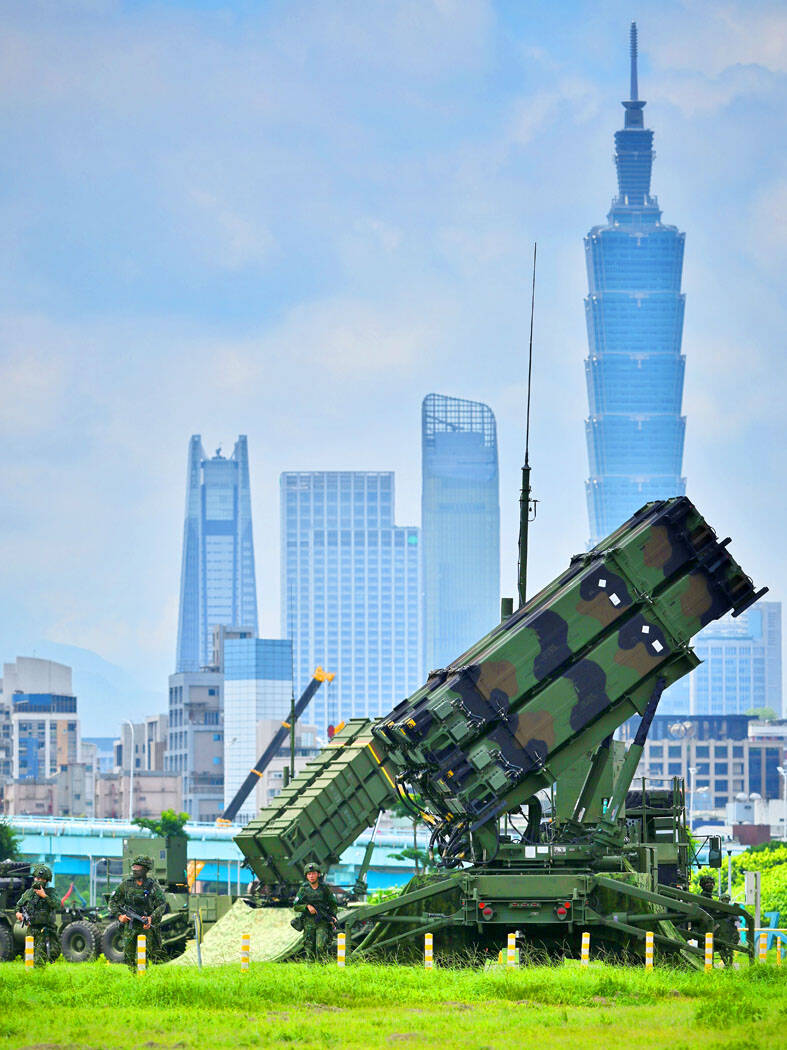
Photo: Chen Yi-kuan, Taipei Times
Although filming or photographing military units in public areas is not prohibited, under the Military Installation Safety Protection Act (軍事營區安全維護條例), which goes into effect on Friday next week, the surveying, filming, photographing or documenting of military sites or designated exercise areas without approval could result in up to three years imprisonment.
However, increased public exposure of military equipment contradicts the principle of operational security, said a military source, who asked to remain anonymous.
Although other options remain despite the exposure of one deployment site, national defense might be affected in a combat situation, given that Taiwan is relatively small, making it easier to identify missile sites, they said.
Nevertheless, the military would continue to facilitate communication with the public through all-out national defense and showcasing certain military zones, the source added.
Institute for National Defense and Security Research researchers Su Tzu-yun (蘇紫雲) and Shu Hsiao-huang (舒孝煌) said it is difficult to completely prevent people from photographing military equipment in public places.
The relaxed atmosphere permitting people to photograph missile launchers might have been intentional, especially given the demeanor of many of the soldiers guarding the sites, Shu said.
That embodied all-out national defense, he added.
The armed forces should take a proportionality based approach to such behavior during off-base training and drills, he said.
For example, people should be allowed to take photos, but countermeasures should be taken if they attempt to get close enough to photograph control panels or use drones to film the equipment, he said.
Although placing military equipment in public places is symbolic of all-out national defense, it should be practiced through more systemic and purposeful arrangements, Shu said.
For example, recently retired F-5 jets could be utilized to hold an event to promote all-out national defense, or certain new equipment could be used to highlight the armed forces’ preparedness for high-tech conflicts, he said.
The military’s noninterference approach toward people photographing equipment is part of a cultural shift in the armed forces, Su said.
Such openness aligns with current practices of the US military, NATO forces and the militaries of most Western countries, and constituted a form of communication that can enhance people’s trust in and understanding of the troops, he said.
Camouflage nets should be used to cover all equipment placed in public sites to prevent exposure of critical details, such as control panels, he added.
The military broadcast live streams of live-fire M1A2T tank drills using 120mm guns and has demonstrated FIM-92 Stinger missiles, as well as presented High Mobility Artillery Rocket Systems and drones multiple times in public places, he said.
That shows that the Ministry of National Defense has been changing its culture and thinking on interacting with the public, Su said.
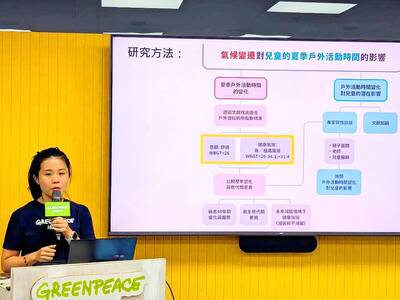
The government should improve children’s outdoor spaces and accelerate carbon reduction programs, as the risk of heat-related injury due to high summer temperatures rises each year, Greenpeace told a news conference yesterday. Greenpeace examined summer temperatures in Taipei, New Taipei City, Taoyuan, Hsinchu City, Taichung, Tainan and Kaohsiung to determine the effects of high temperatures and climate change on children’s outdoor activities, citing data garnered by China Medical University, which defines a wet-bulb globe temperature (WBGT) of 29°C or higher as posing the risk of heat-related injury. According to the Central Weather Administration, WBGT, commonly referred to as the heat index, estimates
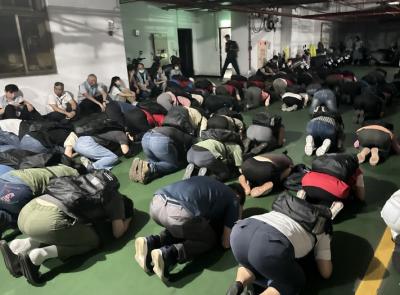
Taipei and other northern cities are to host air-raid drills from 1:30pm to 2pm tomorrow as part of urban resilience drills held alongside the Han Kuang exercises, Taiwan’s largest annual military exercises. Taipei, New Taipei City, Keelung, Taoyuan, Yilan County, Hsinchu City and Hsinchu County are to hold the annual Wanan air defense exercise tomorrow, following similar drills held in central and southern Taiwan yesterday and today respectively. The Taipei Mass Rapid Transit (MRT) and Maokong Gondola are to run as usual, although stations and passenger parking lots would have an “entry only, no exit” policy once air raid sirens sound, Taipei
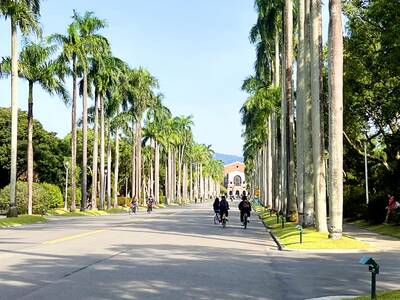
Taipei placed 14th in the Quacquarelli Symonds (QS) Best Student Cities 2026 list, its highest ever, according to results released yesterday. With an overall score of 89.1, the city climbed 12 places from the previous year, surpassing its previous best ranking of 17th in 2019. Taipei is “one of Asia’s leading higher-education hubs,” with strong employer activity scores and students “enjoying their experience of the city and often keen to stay after graduation,” a QS staff writer said. In addition to Taipei, Hsinchu (71st), Tainan (92nd), Taichung (113th) and Taoyuan (130th) also made QS’ list of the top 150 student cities. Hsinchu showed the
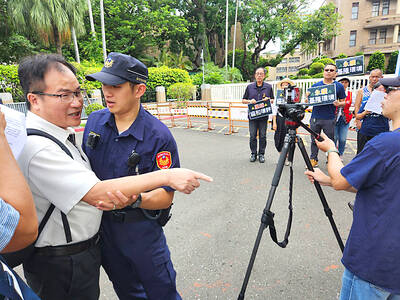
Environmental groups yesterday filed an appeal with the Executive Yuan, seeking to revoke the environmental impact assessment (EIA) conditionally approved in February for the Hsieh-ho Power Plant’s planned fourth liquefied natural gas (LNG) receiving station off the coast of Keelung. The appeal was filed jointly by the Protect Waimushan Seashore Action Group, the Wild at Heart Legal Defense Association and the Keelung City Taiwan Head Cultural Association, which together held a news conference outside the Executive Yuan in Taipei. Explaining the reasons for the appeal, Wang Hsing-chih (王醒之) of the Protect Waimushan Seashore Action Group said that the EIA failed to address